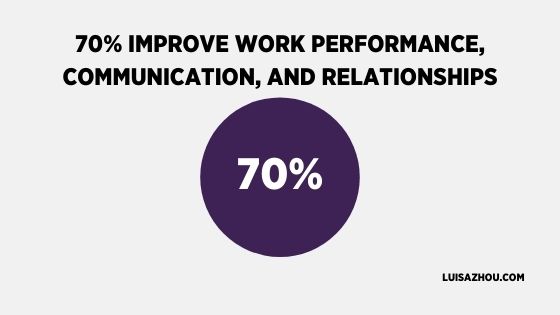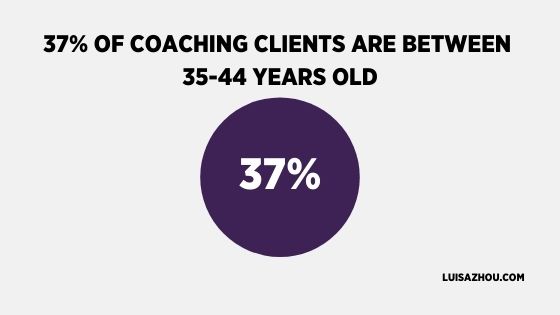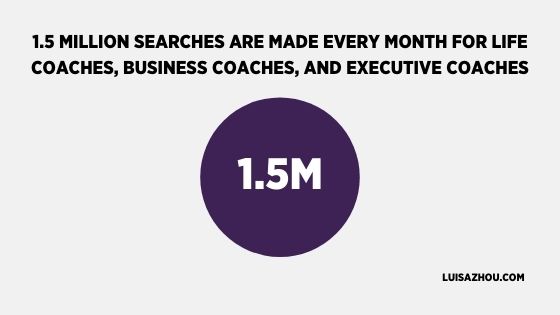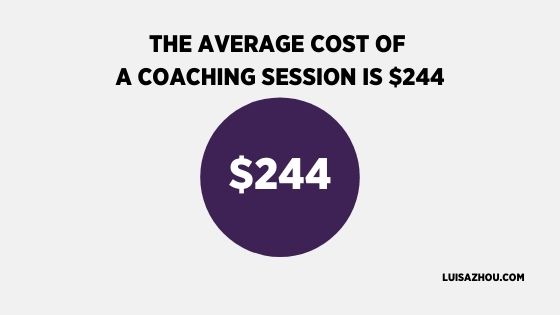What are the most important life coaching statistics?
The life coaching industry is growing quickly. And these 88 statistics show just how powerful life coaching can be.
Want to learn more? Read on!
An overview of key life coaching statistics
- Coaching is a $4.56 billion global industry.
- There are 34,200 certified coaches in the US (109,200 worldwide).
- 99% of individuals and companies who hire a coach are “satisfied” or “very satisfied” with the experience.
- 80% of coaching clients say that they improved their self-esteem or self-confidence thanks to coaching.
- 73% of coaching clients say that coaching helps them improve their relationships, communication skills, interpersonal skills, work performance, work/life balance, and wellness.
- 51% of companies with a strong coaching culture have higher revenues than other companies in their industry.
- 68% of individuals who hired coaches were able to make back their investment.
- The median ROI is 7x the investment.
- Coaching can have a 221% ROI.
- Life coaches make between $100-$150/hour.
Life coaching industry statistics in 2024
What are the key life coaching industry statistics? These statistics show just how important life coaching is as an industry and what it looks like today.
- Coaching is a $4.56 billion global industry. This is a 60% increase since 2019. (2023 ICF Global Coaching Study)
- Here are the shares of all geographical areas:
| North America | $2.08 billion |
| Western Europe | $1.42 billion |
| Latin America and the Caribbean | $332 million |
| Oceania | $195 million |
| Asia | $248 million |
| Eastern Europe | $161 million |
| The Middle East and Africa | $118 million |
- There are 109,200 certified coaches worldwide and 34,200 in North America. (2023 ICF Global Coaching Study)
- In North America, 72% are women (up from 70% in 2019). (2023 ICF Global Coaching Study)
- 80% of coaching clients say that they improved their self-esteem or self-confidence thanks to coaching. (2009 ICF Global Coaching Study)
- 86% of companies said that they at least made back their initial coaching investment. 19% said their return on investment was 50x of what they originally invested. 28% had a 10-49x ROI. The median ROI is 7x the investment. (2009 ICF Global Coaching Study)
- 99% of individuals and companies who hire a coach are “satisfied” or “very satisfied.” 96% would repeat the process. (ICF Global Coaching Client Study)

- 95% say that their coaches are “good” or “excellent.” (2009 ICF Global Coaching Study)
- 68% of individuals who hired coaches were able to make back their investment. Financially, the return on investment was 3.44X the original investment. (2009 ICF Global Coaching Study)
- A case study shows that coaching can have a 221% ROI. (International Society for Performance Improvement)
- 51% of companies with a strong coaching culture have higher revenues than other companies in their industry. (Human Capital Institute)
Benefits of life coaching
What is the ROI of life coaching? Here are the statistics that show how life coaching helps clients get results.
- 73% of coaching clients say that coaching helps them improve their relationships, communication skills (72%), interpersonal skills (71%), work performance (70%), work/life balance (67%), and wellness (63%). (2009 ICF Global Coaching Study)
- Life coaching can improve health outcomes for certain patients. A limited analysis of two randomized controlled trials found that coaching methods that aim to improve self-efficacy and self-empowerment can improve health outcomes especially for people who don’t benefit from intensified interventions. (BMC Health Services Research)
- A case study of women leaders who participated in coaching shows that leadership coaching can help coaching clients improve their self-awareness, self-confidence, self-leadership, leadership style, and their relationship to power, conflict, and personal life. (International Journal of Evidence Based Coaching and Mentoring)
- 70% of coaching clients improve work performance, communication, and relationships thanks to coaching. (Institute of Coaching)

- According to a study, individual and group coaching can help to reduce procrastination and facilitate goal attainment. (Frontiers in Psychology)
- Coaching has positive side effects on performance and skills, wellbeing, coping, goal-directed self-regulation, and work attitudes. (The Journal of Positive Psychology)
- 75% of coaching clients say that the value they get from executive and leadership coaching is “considerably greater” or “far greater” than the money and time they invest. (International Journal of Evidence Based Coaching and Mentoring)
- 30% of business owners who had only had one interaction with a mentor noticed growth in their business. (SCORE)
- Coaching can have a relatively big effect on coaching clients’ coping capacities and resilience, attitudes, subjective wellbeing, goal attainment, and performance. (The Journal of Positive Psychology)
- Over half (51%) of organizations with a strong coaching culture have higher revenue than other, similar companies without the same culture. 62% of employees in these organizations feel highly engaged. (Human Capital Institute)
- A study of 391 people shows that one-on-one coaching can improve coaching clients’ psychological wellbeing and mitigate threats to mental health in the form of excessive and prolonged stress, low resilience, and poor satisfaction with life. (Journal of Medical Internet Research)
- Executive coaching can help women improve their work satisfaction, wellbeing, and performance. (International Journal of Evidence Based Coaching and Mentoring)
- Employees who receive mentoring receive higher compensation, a greater number of promotions, feel more committed and satisfied with their careers, and are more likely to believe that they will advance in their careers than non-mentored employees. (The Journal of Applied Psychology)
- 3x more people lose weight when they work with a health coach compared to other methods. (Obesity (Silver Spring))
- Health coaching can help lower healthcare costs. (Medical Care)
- Wellness coaching can reduce depressive symptoms, perceived stress levels, and improve quality of life and physical, emotional, social, cognitive, and spiritual functioning. (Mayo Clinic)
- Health coaching can improve the management of chronic diseases. It can have a positive effect on people’s social life and their behavioral, physiological, and psychological conditions. People improve their weight management, physical and mental health status, and increase their physical activity. (Patient Education and Counseling)
- Financial coaching and confidence, budgeting, saving, and goal formation have been linked together. (Journal of Financial Theory)
- 54% of people who participated in a financial coaching program and had no prior savings, had some savings at the end of the program. (Citigroup)
- On the other hand, 48% of those with savings at the start of the project increased that amount after receiving financial coaching. (Citigroup)
- 55% of people with unsecured debt at the start of the program had less debt at the end of it. The median decrease was $3,005). (Citigroup)
- 62% of coachees have improved their career opportunities through coaching. (2009 ICF Global Coaching Study)
Life coaching market trends
What does the life coaching market look like today? Here are the top industry trends right now, including what impact COVID-19 had on life coaching. Read on!
- 94% of coach practitioners offer services in addition to coaching, such as consulting, training, and facilitation services. (2020 ICF Global Coaching Study)
- 28% of coach practitioners have engagements of seven or more months. That same number is 40% for coaches with a business specialty. (2020 ICF Global Coaching Study)
- 37% of coaching clients are between 35-44 years old. 30% are 45-54 years old and 24% are under 35 years old. (2020 ICF Global Coaching Study)

- In North America, 49% will invest more in technology as a result of the pandemic. (2020 ICF Covid-19 And The Coaching Industry)
- 55% say that coaching methods won’t return to pre-pandemic methods (such as in-person coaching). (2020 ICF Covid-19 And The Coaching Industry)
- 85% of coaches are accredited or approved by a professional coaching organization (up by 4% from 2015). (2020 ICF Global Coaching Study)
- 95% said they had completed 60 or more hours of training. (2020 ICF Global Coaching Study)
- 65% of coaches identify as business coaches (including areas such as leadership coaching, executive coaching, business/organization coaching, and small business coaching). This figure is up from 62% in 2016. (2020 ICF Global Coaching Study)
- Male coaches are more likely to have a business specialty than women (74% vs 61%). (2020 ICF Global Coaching Study)
- Virtual and in-person coaching are equally effective. (Journal of Occupational and Organizational Psychology)
- The health coaching industry is a $7 billion industry. (Research and Markets)
- There are around 128,000 health coaches in the US. (Research and Markets)
- Business coaching has a market size of $12 billion. (IBISWorld)
- There are about 60,014 business coaching businesses in the US. (IBISWorld)
Demand for life coaches
Is there a demand for life coaches? And what percentage of life coaches are successful? Here’s what you need to know.
- 1.5 million searches are made every month for life coaches, business coaches, and executive coaches. (iPEC)

- 13% of people who hire coaches think that improving their self-esteem and confidence are the most important reasons for hiring a coach. (2009 ICF Global Coaching Study)
- 66% of coaches work with managers, 60% with executives, 56% with entrepreneurs and business owners, 54% with personal clients, 51% with team leaders, 34% with staff members, and 8% with other clients. (2020 ICF Global Coaching Study)
- 15% of coachees report that the most important reason to hire a coach is career opportunities. (2009 ICF Global Coaching Study)
- The three biggest obstacles for organizations that want to build a strong coaching culture are limited support from senior leaders (50%), inability to measure the impact of coaching (42%), and a lack of budget for coaching activities (38%). (2020 ICF Global Coaching Study)
Life coach income
What is the going rate for a life coach? And is life coaching a viable career? These are the top life coaching income statistics.
- The average cost of a coaching session is $244. Coaching sessions can cost up to $1,000. (International Coaching Federation)

- The average annual income from coaching in the US is $62,500. (2020 ICF Global Coaching Study)
- In Western Europe, that same number is $51,100. In Oceania, coaches make, on average, $61,100, in the Middle East and Africa, $34,900, in Asia, $33,600, in Latin America and the Caribbean, $20,900, and in Eastern Europe, $19,100. (2020 ICF Global Coaching Study)
- Life coaches make between $100-$150/hour. (CNBC)
- Executive coaches in the US tend to charge $120/hour if they have less than a year’s experience. Those with 10+ years of experience charge $330/hour and up. The same figure in Western Europe is $288 and up. For sought-after coaches, the figure can be significantly higher. (Financial Times)
- The most important predictor of a coach’s income/revenue are years of experience. (2020 ICF Global Coaching Study)
- 93% of coaches offer additional services, such as consulting and counseling. (2020 ICF Global Coaching Study)
- Coaches who offer other services allocate 44% of their time to coaching. (2020 ICF Global Coaching Study)
- Salaries for life coach job openings go from $27,000 to $128,500. (ZipRecruiter)
- 49% of coaches said that they experienced reduced income due to Covid-19. (2020 ICF Covid-19 And The Coaching Industry)
- 37% said that their hours had been reduced. (2020 ICF Covid-19 And The Coaching Industry)
- At the same time, 34% of coaches didn’t notice any impact of the pandemic on their businesses. (2020 ICF Covid-19 And The Coaching Industry)
- Business-related coaching saw a bigger portion of income losses compared to non-business-related coaching (54% vs 44%). (2020 ICF Covid-19 And The Coaching Industry)
- The same goes for reductions in working hours (39% vs 32%). (2020 ICF Covid-19 And The Coaching Industry)
- What’s more, 40% of all coaches said that the negative impact of Covid-19 on their businesses was slightly negative. 25% said it was significantly negative. (2020 ICF Covid-19 And The Coaching Industry)
- Coaches who work independently and not in any organization reported the least overall impact of Covid-19 on their businesses (9%). Internal coaches reported the most (23%). (2020 ICF Covid-19 And The Coaching Industry)
Over to you!
There you have it. Now you know what the most important life coaching statistics are.
Want to learn more about becoming a life coach?
Read more:
How to Start a Life Coaching Business
The Top Life Coaching Certifications
How Much Do Life Coaches Make?
Sources:
2023 ICF Global Coaching Study
2020 ICF Global Coaching Study
2009 ICF Global Coaching Study
ICF Global Coaching Client Study
International Society for Performance Improvement
International Journal of Evidence Based Coaching and Mentoring
The Journal of Positive Psychology
International Journal of Evidence Based Coaching and Mentoring
Journal of Medical Internet Research
International Journal of Evidence Based Coaching and Mentoring
The Journal of Applied Psychology
Patient Education and Counseling
2020 ICF Covid-19 And The Coaching Industry
Journal of Occupational and Organizational Psychology
International Coaching Federation









One Response
This was very helpful. Although, I suspect many of these stats will change in the next few years. There’s such a wild influx of both coaches and clients in the industry that it’ll take some time to discover the best ways to find and work with each other. Thanks for all the info you share Luisa.